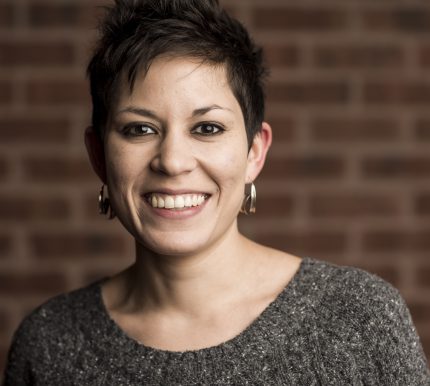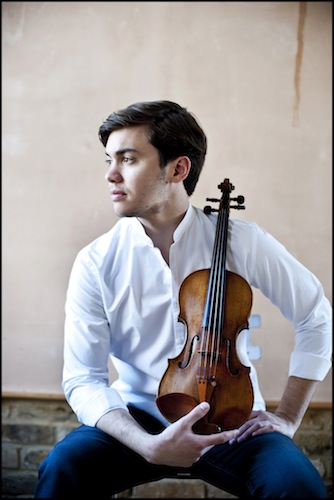Ogonek premiere offers a violin concerto for our time at MusicNOW

The final MusicNOW concert of the season took place Monday night at the Harris Theater, and was devoted to two large-scale works inspired by religion. And though starkly different in their means and varied in results, performances were given consistently strong advocacy under the direction of the young Chinese conductor, Elim Chan.
The evening’s main event was the world premiere of In Silence by Elizabeth Ogonek, the Chicago Symphony Orchestra’s co-composer in residence.
In Silence has dueling inspirations as Ogonek outlined in her video introduction. The composer’s mother was a church organist and Ogonek grew up attending numerous church events during which she would sit “in silence” in the choir loft during multiple services and repeated homilies.
The other, more direct, musical inspiration is from Heinrich Biber’s “Rosary” or “Mystery” Sonatas. These fascinating 17th-century works for solo violin were written as devotions to Mary and Jesus, and are strikingly inventive and forward-looking in their harmonies and unorthodox tunings.
In Silence is scored for solo violin with a backing ensemble of pairs of violas, cellos, and double-basses, with piano and percussion. The work is a violin concerto in all but name, cast in the traditional three movements and spanning 35 minutes. Ogonek draws her main thematic material from Biber’s motifs, but the notes are often inverted and refracted, as well as transcribed in different keys.
The result is music that is strikingly individual and uniquely compelling–In Silence manages to be both comfortingly traditional yet edgy and disquieting.
The music is varied with great skill, with isolated hyperactive bursts of solo violin virtuosity breaking up the see-sawing lines. At times the solo lines–played with a sweet, acutely focused tone by the gifted violinist Benjamin Beilman–are lushly Romantic. There is a melancholy waltz-like theme in the middle movement and elegiac moments with a yearning expression for the soloist.
Yet the tonal center doesn’t quite hold in the writing for the backing ensemble. Rather than merely echoing the lyrical solo lines, the ensemble’s dark Baroquey string textures–and piano and percussion, especially–often provide a biting, subversive commentary.
As always with Ogonek’s music there is an intelligence and compelling concentration about this work. When so much new music feels aimless or merely gestural, Ogonek writes with confidence and a sense of a firm destination in view. So quirky and intriguing is her writing for both the violin and backing octet that you find yourself leaning forward, wondering what is coming next.
In Silence is a violin concerto for our time–soloistic, expressive and often lyrical, yet tense, restless and unsettled in a way that feels very 21st century.
One could hardly have wanted a finer premiere than that delivered by Beilman and the ensemble musicians. While playing with great warmth of tone, Beilman was alive to the mercurial qualities and handled the bravura breakouts with unruffled flair.
Making her MusicNOW debut, conductor Chan led the ensemble in a tautly focused and acutely balanced performance.
Th evening began with On the Guarding of the Heart by Đuro Živković, a Serbian-born composer resident in Sweden.
Živković states that his work is a “sound painting” of the Philokalia, a collection of ancient Eastern Orthodox writings of Greek origin. More personally, the title refers to the need to guard one’s heart against evil influences, says the composer, and to reach a solitude and “hard-achieved detachment” from the world.
Živković calls his work for chamber orchestra “an instrumental cantata” and the music is Bachian in title but little else. The alternates between twisty, driven activity with an emphasis on low instrumental timbres and widely spaced, spare textures. Halfway through a luminous passage for string quartet bestows a sort-of spiritual glow before a return to the edgy hurly-burly.
Yet ultimately Živković’s work feels repetitive and somewhat directionless, failing to sustain interest over its nearly half-hour length. Like so many contemporary works, the music fails to make a broader argument beyond its instrumental challenges and timbral effects.
No complaints about the playing with Chan leading an energetic performance of bracing textural clarity.
___________
The 2017-18 season will mark the 20th anniversary of the MusicNOW series. The concerts will lead off October 2 with a retrospective program offering works by former CSO composers-in-residence Augusta Read Thomas, Mark-Anthony Turnage, Osvaldo Golijov and Anna Clyne. The second program November 13 will offer an evening of music by composer and pianist Vijay Iyer.
On April 2, the series will present Savior, a full-length music-theater work by composer Amy Beth Kirsten. The series will close with Esa-Pekka Salonen leading a TBA program May 21 at Symphony Center. cso.org; 312-294-3000.
Posted in Performances





